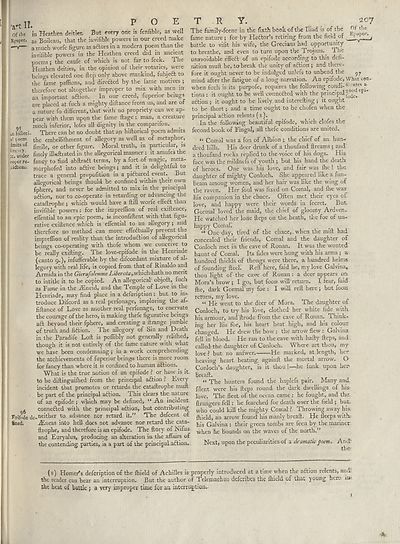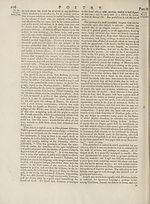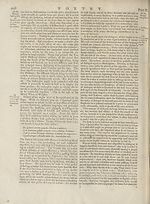Encyclopaedia Britannica > Volume 15, PLA-RAM
(245) Page 207
Download files
Complete book:
Individual page:
Thumbnail gallery: Grid view | List view

•a't II. 1 U ^
of (he in Heathen deities. But every one is fenfible, as well
Epopee. as Boileau, that the invifible powers m our creed make
—v— a roach worfe figure as aftors in a modern poem than the
invifible powers in the Heathen creed did in ancient
poems; the caufe of which is not far to feek. 1 he
Heathen deities, in the opinion of their votaries, were
beings elevated one Hep only above mankind, fubjedt to
the fame paffions, and direaed by the fame motives ;
therefore not altogether improper to mix with men in
an important adion. In our creed, fuperior beings
are placed at fuch a mighty difiance from us, and are of
a nature, fo different, that with no propriety can we ap¬
pear with them upon the fame ftage: man, a creature
much inferior, lofes all dignity in the comparifon.
in hiftori- There can be no doubt that an hlftorical poem admits
al poem t}ie embelliihment of allegory as well as of metaphor,
imits of fimile, or other figure. Moral truth, in particular, is
!Sder finely iUuftrated in the afiegorical manner : it amufes the
roper re- fancy to find abftradt terms, by a fort of magic, meta-
;iidiom, morphofed into aftive beings; and it is delightful to
trace a general propofition in a pictured event. But
allegorical' beings fiiould be confined within their own
fphere, and never be admitted to mix in the principal
a&ion, nor to co-operate in retarding or advancing the
cataftrophe ; which would have a ftill worfe effed than
invifible powers: for the impreffion of real exiftence,
efiential to an epic poem, is inconfifient with that figu¬
rative exifience which is eflential to an allegory ; and
therefore no method can more effedually prevent the
imprefiion of reality than the introdudion of allegorical
beings co-operating with thofe whom. we conceive to
be really exiftmg. The love-epifode in the Henriade
(canto 9.), infufferable by the difcordant mixture of al¬
legory with real life, is copied from that of Rinaldo and
Armida in the Gierufahmme Liberataj.whichfiath no merit
to intitle it to be copied. An allegorical1 objed, fuch
as Fame in the ALueid, and the T. emple of Love in the
Henriade, may find place in a defsription : but to in^
troduce Difcord as a real perfonage, imploring the af-
fiftance of Love as another real perfonage, to enervate
the courage of the hero, is making thefe figurative beings
ad beyond their fphere, and creating a firange jumble
of truth and fi6tion. The allegory of Sin and Death
in the Paradife Loft is poffibly not generally .reliflied,
though it is not entirely of the lame nature with what
we have been condemning ; in a work comprehending
the atchievements of fuperior beings there is more room
for fancy than wdiere it is confined to human adions.^
What is the true notion of an epifode ? or how is it.
to be diftinguilhed from the principal adion ? Every
incident that promotes or retards the cataftrophe muft
be part of the principal adion. This clears the nature
of an epifode ; which may be defined, “ An incident
, conneded with the principal adion, but contributing
FpiMe de-ne^er to advance nor retard it.” "The defeent of
Sned. Atneas into hell does not advance nor retard the cata¬
ftrophe, and therefore is an epifode. The ftory of Nifus
and Euryalus, producing an alteration in the affairs of
the contending parties, is a part of the principal.adiou.
T . R Y. 207
The family-feene in the lixth book of the Iliad is of the ™ tbe
fame nature ; for by Heitor’s retiring from the field of .
battle to vifit his wife, the Grecians had opportunity
to breathe, and even to turn upon the .Trojans.. The
unavoidable effed of an epifode according to this defi¬
nition muft be, to break the unity of adion ; and there¬
fore it ought never to be indulged unlefs to unbend the ^
mind after the fatigue of a long narration. An epifode, What con*
when fuch is its purpofe, requires the following condi-
tions : it ought to be well conneded with the principal
adion ; it ought to be lively and interefting ; it ought
to be Ihort; and a time ought to be chofen when the
principal adion relents (e).
In the following beautiful epifode, which clofes the
fecond book of Fingal, all thefe conditions are united.
“ Comal was a fon of Albion ; the chief of an hun¬
dred hills. His deer drunk of a thoufand ftreams ; and
a thoufand rocks replied to the voice of his dogs. His
face was the mildnefs of youth \ but his hand tne death
of heroes. One was his love, and fair was (he ! the
daughter of mighty Conloch. She appeared like a fun-
beam among women, and her hair was like the wing of
the raven. Her foul was fixed on Comal, and (he was-
his companion in the chace. Often met their eyes of
love, and happy were their words in fecret. But
Gonrial loved the maid, the chief of gloomy Ardven.
He watched her lone fteps on the heath, the foe of un¬
happy Cornali
“ One day, tired of the chace, when the mift had
concealed their friends, Comal and the daughter of
Conloch met in the cave of Ronan. It was the wonted
haunt of Comal. Its fides were hung with his arms ; a
hundred (hields of thongs were there, a hundred helms
of founding fteeh Reft here, faid he, my love Galvina,
thou light of the cave of Ronan : a deer appears on
Mora’s brow; I go, but foon will return. I fear, faid
(he, dark Gormal my foe : I will reft here ; but foon
return, my love.
“ He went to the deer of Mora. The daughter.of
Conloch, to try his love, clothed her white fide with
his armour, and'ftrode from the cave of Ronan. Think¬
ing her His foe, his heart beat high, and his colour
changed. He drew the bow : the arrow flew : Galvina
fell in blood. He ran to the cave with hafty fteps, and.
called the daughter of. Conloch. Where art thou, my
love ? but no anfwer. He marked, at length, her
heaving heart beating againll the mortal arrow. O
Conloch’s- daughter, is it thou!—he funk upon her-
brtaft.
“ The hunters found the haplefs pair. Many and
filent were his fteps round the dark dwellings of his
love. The fleet of the ocean came : he fought, and the.
ftrangers fell: he fearched for death over the field ; but
who could kill the mighty Comal ? Throwing away his.
(hield, an arrow found his manly breaft. He fleeps with,
his Galvina : their green tombs are feen by the mariner
when he bounds on the waves of the north.”
Next, upon the peculiarities of a dramatic poem. Ami’
the
(e) Homer's defeription of the {hield of Achilles is properly introduced at a time when the aftion relents, and
the reader can bear an interruption. But the author of Telemachus defetibes the ftlield of that young hero 11*
the heat of battle j a very improper time for an interruption.
%
1
of (he in Heathen deities. But every one is fenfible, as well
Epopee. as Boileau, that the invifible powers m our creed make
—v— a roach worfe figure as aftors in a modern poem than the
invifible powers in the Heathen creed did in ancient
poems; the caufe of which is not far to feek. 1 he
Heathen deities, in the opinion of their votaries, were
beings elevated one Hep only above mankind, fubjedt to
the fame paffions, and direaed by the fame motives ;
therefore not altogether improper to mix with men in
an important adion. In our creed, fuperior beings
are placed at fuch a mighty difiance from us, and are of
a nature, fo different, that with no propriety can we ap¬
pear with them upon the fame ftage: man, a creature
much inferior, lofes all dignity in the comparifon.
in hiftori- There can be no doubt that an hlftorical poem admits
al poem t}ie embelliihment of allegory as well as of metaphor,
imits of fimile, or other figure. Moral truth, in particular, is
!Sder finely iUuftrated in the afiegorical manner : it amufes the
roper re- fancy to find abftradt terms, by a fort of magic, meta-
;iidiom, morphofed into aftive beings; and it is delightful to
trace a general propofition in a pictured event. But
allegorical' beings fiiould be confined within their own
fphere, and never be admitted to mix in the principal
a&ion, nor to co-operate in retarding or advancing the
cataftrophe ; which would have a ftill worfe effed than
invifible powers: for the impreffion of real exiftence,
efiential to an epic poem, is inconfifient with that figu¬
rative exifience which is eflential to an allegory ; and
therefore no method can more effedually prevent the
imprefiion of reality than the introdudion of allegorical
beings co-operating with thofe whom. we conceive to
be really exiftmg. The love-epifode in the Henriade
(canto 9.), infufferable by the difcordant mixture of al¬
legory with real life, is copied from that of Rinaldo and
Armida in the Gierufahmme Liberataj.whichfiath no merit
to intitle it to be copied. An allegorical1 objed, fuch
as Fame in the ALueid, and the T. emple of Love in the
Henriade, may find place in a defsription : but to in^
troduce Difcord as a real perfonage, imploring the af-
fiftance of Love as another real perfonage, to enervate
the courage of the hero, is making thefe figurative beings
ad beyond their fphere, and creating a firange jumble
of truth and fi6tion. The allegory of Sin and Death
in the Paradife Loft is poffibly not generally .reliflied,
though it is not entirely of the lame nature with what
we have been condemning ; in a work comprehending
the atchievements of fuperior beings there is more room
for fancy than wdiere it is confined to human adions.^
What is the true notion of an epifode ? or how is it.
to be diftinguilhed from the principal adion ? Every
incident that promotes or retards the cataftrophe muft
be part of the principal adion. This clears the nature
of an epifode ; which may be defined, “ An incident
, conneded with the principal adion, but contributing
FpiMe de-ne^er to advance nor retard it.” "The defeent of
Sned. Atneas into hell does not advance nor retard the cata¬
ftrophe, and therefore is an epifode. The ftory of Nifus
and Euryalus, producing an alteration in the affairs of
the contending parties, is a part of the principal.adiou.
T . R Y. 207
The family-feene in the lixth book of the Iliad is of the ™ tbe
fame nature ; for by Heitor’s retiring from the field of .
battle to vifit his wife, the Grecians had opportunity
to breathe, and even to turn upon the .Trojans.. The
unavoidable effed of an epifode according to this defi¬
nition muft be, to break the unity of adion ; and there¬
fore it ought never to be indulged unlefs to unbend the ^
mind after the fatigue of a long narration. An epifode, What con*
when fuch is its purpofe, requires the following condi-
tions : it ought to be well conneded with the principal
adion ; it ought to be lively and interefting ; it ought
to be Ihort; and a time ought to be chofen when the
principal adion relents (e).
In the following beautiful epifode, which clofes the
fecond book of Fingal, all thefe conditions are united.
“ Comal was a fon of Albion ; the chief of an hun¬
dred hills. His deer drunk of a thoufand ftreams ; and
a thoufand rocks replied to the voice of his dogs. His
face was the mildnefs of youth \ but his hand tne death
of heroes. One was his love, and fair was (he ! the
daughter of mighty Conloch. She appeared like a fun-
beam among women, and her hair was like the wing of
the raven. Her foul was fixed on Comal, and (he was-
his companion in the chace. Often met their eyes of
love, and happy were their words in fecret. But
Gonrial loved the maid, the chief of gloomy Ardven.
He watched her lone fteps on the heath, the foe of un¬
happy Cornali
“ One day, tired of the chace, when the mift had
concealed their friends, Comal and the daughter of
Conloch met in the cave of Ronan. It was the wonted
haunt of Comal. Its fides were hung with his arms ; a
hundred (hields of thongs were there, a hundred helms
of founding fteeh Reft here, faid he, my love Galvina,
thou light of the cave of Ronan : a deer appears on
Mora’s brow; I go, but foon will return. I fear, faid
(he, dark Gormal my foe : I will reft here ; but foon
return, my love.
“ He went to the deer of Mora. The daughter.of
Conloch, to try his love, clothed her white fide with
his armour, and'ftrode from the cave of Ronan. Think¬
ing her His foe, his heart beat high, and his colour
changed. He drew the bow : the arrow flew : Galvina
fell in blood. He ran to the cave with hafty fteps, and.
called the daughter of. Conloch. Where art thou, my
love ? but no anfwer. He marked, at length, her
heaving heart beating againll the mortal arrow. O
Conloch’s- daughter, is it thou!—he funk upon her-
brtaft.
“ The hunters found the haplefs pair. Many and
filent were his fteps round the dark dwellings of his
love. The fleet of the ocean came : he fought, and the.
ftrangers fell: he fearched for death over the field ; but
who could kill the mighty Comal ? Throwing away his.
(hield, an arrow found his manly breaft. He fleeps with,
his Galvina : their green tombs are feen by the mariner
when he bounds on the waves of the north.”
Next, upon the peculiarities of a dramatic poem. Ami’
the
(e) Homer's defeription of the {hield of Achilles is properly introduced at a time when the aftion relents, and
the reader can bear an interruption. But the author of Telemachus defetibes the ftlield of that young hero 11*
the heat of battle j a very improper time for an interruption.
%
1
Set display mode to:
![]() Universal Viewer |
Universal Viewer | ![]() Mirador |
Large image | Transcription
Mirador |
Large image | Transcription
Images and transcriptions on this page, including medium image downloads, may be used under the Creative Commons Attribution 4.0 International Licence unless otherwise stated. ![]()
| Encyclopaedia Britannica > Encyclopaedia Britannica > Volume 15, PLA-RAM > (245) Page 207 |
|---|
| Permanent URL | https://digital.nls.uk/191903961 |
|---|
| Attribution and copyright: |
|
|---|
| Description | Ten editions of 'Encyclopaedia Britannica', issued from 1768-1903, in 231 volumes. Originally issued in 100 weekly parts (3 volumes) between 1768 and 1771 by publishers: Colin Macfarquhar and Andrew Bell (Edinburgh); editor: William Smellie: engraver: Andrew Bell. Expanded editions in the 19th century featured more volumes and contributions from leading experts in their fields. Managed and published in Edinburgh up to the 9th edition (25 volumes, from 1875-1889); the 10th edition (1902-1903) re-issued the 9th edition, with 11 supplementary volumes. |
|---|---|
| Additional NLS resources: |
|

